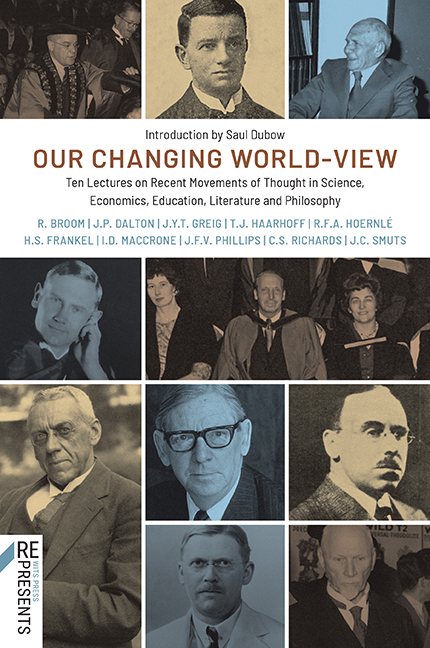 Our Changing World-View
Our Changing World-View Book contents
- Frontmatter
- Contents
- Introduction
- Preface
- Miscellaneous Frontmatter
- 1 Some Recent Scientific Advances in Their Bearing on Philosophy
- 2 The Material World—Yesterday and Today
- 3 Evolution—Design or Accident?
- 4 Man at the Crossroads
- 5 Psychology in Perspective
- 6 Literature in the Machine Age
- 7 The Holistic Attitude in Education
- 8 Our Changing Economic World
- 9 Africa in the Re-Making
- 10 Old Truths and New Discoveries
9 - Africa in the Re-Making
Published online by Cambridge University Press: 12 October 2021
- Frontmatter
- Contents
- Introduction
- Preface
- Miscellaneous Frontmatter
- 1 Some Recent Scientific Advances in Their Bearing on Philosophy
- 2 The Material World—Yesterday and Today
- 3 Evolution—Design or Accident?
- 4 Man at the Crossroads
- 5 Psychology in Perspective
- 6 Literature in the Machine Age
- 7 The Holistic Attitude in Education
- 8 Our Changing Economic World
- 9 Africa in the Re-Making
- 10 Old Truths and New Discoveries
Summary
We South Africans are not in Africa alone. Our European civilization is in the main the product of successive waves of the dominant world culture of the West.
At least it is foolish for us to attempt to ignore changes in the worldviews on matters that affect our society; at most it may prove extremely dangerous to the future of the South African State.
One sphere in which worldviews have been changing rapidly is in the relationship between Western civilization, the more static cultures of the East and the so-called primitive peoples, such as the Bantu and other Negro tribes of Africa.
It is the fundamental character of this change and its great importance to the citizens of Africa which is my excuse for attempting to deal with the subject of this address, aware as I am of the vast field into which I am entering, armed only with the alltoo- inadequate tools of the economist and the economic historian.
Moreover, the method of approach of the economist tends to be unpopular. He is interested primarily in discovering the sequences between social factors, and the discovery of the real sequences is often inconvenient to vested interests and irreconcilable with long-cherished traditional beliefs. But fundamental sequences persist and eventually the scientist succeeds in establishing this truth even in social relationships.
A most fundamental cause of all economic difficulties, apart from the fact of scarcity, is the fact of change in human wants and desires.
Such changes are not, as many think, in themselves merely capricious. They are inherent in the simple fact that it is not possible to guarantee that man at no time in the future shall think otherwise, and therefore act otherwise, than he does today; that at no time he shall change his conception of his environment or his powers over it. We know that these changes may be so slow as to be almost imperceptible or so rapid as to spell tragedy to those subjected to them. But we know also that they can never be eliminated entirely.
Moreover, it is not possible to guarantee that change will always be beneficial to all.
- Type
- Chapter
- Information
- Our Changing World-ViewTen Lectures on Recent Movements of Thought in Science, Economics, Education, Literature and Philosophy, pp. 197 - 222Publisher: Wits University PressPrint publication year: 2021


